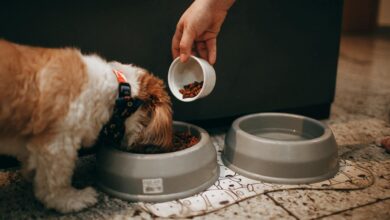
Pets are extra than simply animals; they’re cherished members of our households. Feeding your furry buddy well-being begins with correct vitamin. Welcome to the last word information to pet vitamin, the place we’ll delve into the artwork of feeding your pet for optimum well being and happiness.
Table of contents
Understanding Pet Diet
What Is Pet Diet?
Pet vitamin encompasses the dietary wants of the one you love canine or cat. It is the cornerstone of their well being, longevity, and total high quality of life. Similar to people, pets require a balanced weight loss plan to thrive.
Correct pet vitamin means offering a weight loss plan that features important vitamins equivalent to proteins, carbohydrates, fat, nutritional vitamins, and minerals. These vitamins help varied bodily capabilities, together with vitality manufacturing, immune system well being, and the upkeep of wholesome pores and skin and coat.
Completely different Sorts of Pet Meals
The market affords a large number of pet meals choices, from kibble to canned, uncooked to home-cooked. We’ll discover the professionals and cons of every, serving to you select one of the best meals to your pet’s particular wants.
Dry Kibble: Dry kibble is handy and helps preserve dental well being by lowering plaque buildup. It is a good possibility for pets with wholesome enamel and no particular dietary necessities.
Canned Meals: Canned meals is moisture-rich, making it a wonderful selection for pets that want extra hydration. It is typically extra palatable and appropriate for choosy eaters.
Uncooked and Residence-Cooked Diets: These diets present extra management over substances and could be tailor-made to particular dietary wants. Nevertheless, they require cautious preparation to make sure balanced vitamin.
Selecting the Proper Pet Meals for Your Pet
Choosing the perfect pet meals includes contemplating your pet’s age, breed, measurement, and any present well being circumstances. We offer skilled steerage on making this significant resolution.
When selecting pet meals, search for choices that meet the Affiliation of American Feed Management Officers (AAFCO) requirements. This ensures that the meals meets the minimal dietary necessities to your pet’s life stage.
Think about your pet’s age:
- Pet and Kitten Meals: These formulations help speedy development and improvement.
- Grownup Pet Meals: Appropriate for pets of their prime years.
- Older Pet Meals: Addresses the altering wants of ageing pets, equivalent to joint help and decrease calorie content material.
In case your pet has particular well being issues, seek the advice of together with your veterinarian for suggestions. They will counsel specialised diets to handle allergy symptoms, sensitivities, or medical circumstances.
Feeding Your Pet at Completely different Life Levels
Pet and Kitten Diet
Discover ways to nourish your younger furry companion for wholesome development and improvement. We’ll cowl the distinctive dietary necessities of puppies and kittens.
Puppies: Puppies want extra energy, protein, and fats than grownup canine to help their development. Select a pet meals that’s particularly formulated for his or her wants.
Kittens: Kittens additionally require larger ranges of protein and fats. Search for kitten-specific meals to make sure they get the vitamins they want for correct improvement.
Grownup Pet Diet
As your pet matures, their dietary wants change. Uncover the secrets and techniques to sustaining their vitality and well-being throughout maturity.
Grownup canine and cats require a balanced weight loss plan that gives the correct amount of vitamins to help their exercise stage and total well being. Search for meals labeled as “full and balanced” for his or her particular life stage.
Older Pet Diet
For our older pets, a tailor-made weight loss plan is crucial for managing age-related points. Learn the way to present one of the best care of their golden years.
Older pets might profit from meals formulated to help joint well being and handle weight. Moreover, their calorie consumption might should be adjusted to stop weight problems and preserve a wholesome weight.
Feeding Your Furry Buddy
Debunking Widespread Pet Diet Myths
Separating truth from fiction is important in pet vitamin. We’ll bust some prevalent myths to make sure you make knowledgeable decisions.
Delusion 1: Pets Ought to Eat a Uncooked Weight-reduction plan Solely
- Whereas uncooked diets are an possibility, they carry the danger of bacterial contamination and will not present all vital vitamins.
Delusion 2: Grain-Free Diets Are All the time Higher
- Grains could be a part of a wholesome pet weight loss plan, and grain-free meals is probably not appropriate for all pets.
Delusion 3: Do-it-yourself Diets Are All the time More healthy
- Do-it-yourself diets could be difficult to stability accurately and will lack important vitamins.
Ideas for Feeding Your Pet a Wholesome Weight-reduction plan
Uncover sensible ideas for making a well-balanced, nutritious meal plan that retains your pet completely happy and wholesome.
Portion Management: Measure your pet’s meals to keep away from overfeeding, which might result in weight problems.
Common Feeding Schedule: Stick with a constant feeding schedule to ascertain a routine to your pet.
Excessive-High quality Components: Select pet meals with actual meat and high-quality substances.
Hydration: Guarantee your pet has entry to recent water always.
Particular Dietary Wants and Pet Well being
Stopping Pet Weight problems
Weight problems is a rising concern amongst pets. Discover ways to preserve a wholesome weight and forestall obesity-related well being issues.
Weight problems can result in varied well being points in pets, together with diabetes, joint issues, and coronary heart illness. To forestall weight problems, feed your pet the suitable portion measurement, present common train, and keep away from extreme treats.
Coping with Choosy Eaters
Is your pet a finicky eater? We’ll share methods to entice their style buds and guarantee they get the vitamins they want.
Selection: Rotate totally different flavors and kinds of meals to maintain mealtime attention-grabbing.
Treats in Moderation: Use treats as rewards however keep away from overindulgence.
Seek the advice of Your Veterinarian: In case your pet’s choosy consuming persists, seek the advice of your veterinarian to rule out any underlying well being points.
Dietary Wants for Pets with Well being Points
Some pets require specialised diets resulting from allergy symptoms, sensitivities, or medical circumstances. Learn the way to cater to their distinctive wants.
Seek the advice of your veterinarian in case your pet has particular well being points. They will suggest particular diets tailor-made to handle circumstances like meals allergy symptoms, urinary tract issues, or kidney illness.
Pet Care Past Diet
Pet vitamin is only one aspect of complete pet care. Discover important elements like train, grooming, and common vet check-ups to guarantee your pet thrives.
Train: Common bodily exercise is essential to your pet’s total well being and psychological well-being.
Grooming: Correct grooming not solely retains your pet wanting their greatest but in addition prevents pores and skin points and matting.
Common Vet Verify-Ups: Schedule common visits to the veterinarian for vaccinations, preventive care, and early detection of well being issues.
The place to Discover Pet Provides
Uncover one of the best sources for high quality pet meals and provides to help your pet’s dietary wants.
You will discover pet meals and provides at pet shops, on-line retailers, and even by subscription companies. Think about your comfort, funds, and your pet’s particular wants when selecting the place to buy.
Feeding Your Furry Buddy
Your furry buddy’s well being and happiness rely upon the care you present, beginning with vitamin. By following this final information to pet vitamin, you will be well-equipped to make knowledgeable selections and provides the one you love pet one of the best life doable. Keep in mind, a well-fed pet is a contented pet!
Incorporate these skilled ideas into your pet care routine, and watch as your furry companion prospers, dwelling their life to the fullest. For extra insightful steerage on pet vitamin and total pet care, keep tuned to our weblog.
Be sure that to bookmark this web page for future reference, and when you have any questions or issues about your pet’s weight loss plan, seek the advice of together with your veterinarian for personalised recommendation. Your pet’s well-being is value it.








